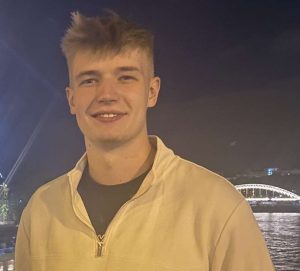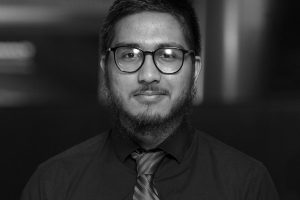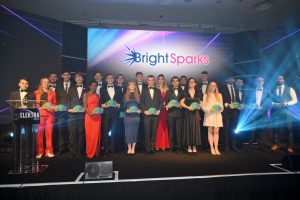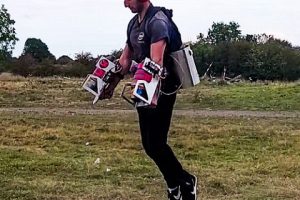Here, in our series on the latest EW BrightSparks of 2023, we highlight Matthew Cossins, a Final Year MEng Electrical and Electronic Engineering Student at the University of Nottingham.
Achievement
Matthew told us of his strong interest in solving problems and challenges in a sustainable manner, helping to improve society. He told us he was optimistic that technology is the solution, and he is very proud to have already achieved multiple engineering awards and scholarships.
During sixth form, for example, he held a prestigious Arkwright Scholarship, sponsored by Arm.
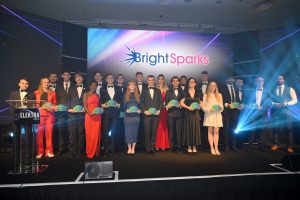 In his first year at the University of Nottingham, he was offered both an IET Diamond Jubilee Scholarship, sponsored by Thales, and a UKESF Scholarship, which he accepted, sponsored by Capgemini Engineering.
In his first year at the University of Nottingham, he was offered both an IET Diamond Jubilee Scholarship, sponsored by Thales, and a UKESF Scholarship, which he accepted, sponsored by Capgemini Engineering.
In his second year, Matthew received the Michael Bromwich Prize for achieving one of the top two highest grades in his year at Nottingham, and in his third year he achieved the highest grade again and received the Nottingham Advantage Award for completing three extra-curricular modules: a virtual consultancy challenge for a wearable technology start-up, a BP-funded research internship with the Nottingham Solar Racing Team, and peer mentoring younger engineering students.
Matthew also received the Nottingham Engineering Excellence Award in all three years for achieving in the top 5% of students on Engineering degrees.
The research internship was part of the Nottingham Summer Engineering Research Programme, we learned. He developed MATLAB electric and thermal models for Nissan Leaf EV batteries that could be used for simulating the battery when designing a battery management system – for regulations and health/safety. They could also form part of a larger simulation to model the solar-car’s performance in an endurance race.
He has long been interested in electric vehicles, he told us, but was always been sceptical due to their poor range, and their reliance on electricity generated by fossil fuels. This placement was perfect, he felt, as solar-power can extend range through constant charging, and is renewable, alleviating both issues (though there are issues with the manufacturing being reliant on fossil fuels so solar cars are not fully sustainable – a new issue to solve, he notes).
Matthew also recently completed the 12-month engineering placement with Capgemini, based in Bath at the High-Integrity Expertise Centre. Across the year, he worked on two industry projects. His first project was to improve code-review efficiency in high-integrity (specifically aerospace) projects by 10%. This small efficiency increase has the potential to massively cut costs on large projects.
In a small team of around 3 people, they delivered a front-end typescript extension for VS Code with a back-end Java language server that could support existing code-review procedures within the IDE – with local Git integration, communication with the remote bitbucket repository, and support for multiple compliance tools.
This massively reduced headache when completing code-reviews, he highlighted, as everything the engineer required could be found in the development IDE. It also allowed them to add additional features that department Software Architects requested. This ultimately meant that their software also made the code-review process more reliable and robust.
Note that prior to starting his placement, Matthew had no experience using Java or Typescript, but he quickly became proficient in both. His prior experience with version control and Git was also very minimal. With these concepts being integral to code-review, and therefore to the project, he became extremely skilled at using Git, and became capable of writing software to integrate Git tools and functions. Naturally, he also became very practiced in conducting code-reviews.
His second project was to develop the first xHCI USB drivers, written in C, for the secure microkernel seL4 (on Avnet Maaxboard). He joined this project six months into its R&D, but was able to onboard quickly just as development was ramping up. After two weeks, he started the process of supporting a USB keyboard, a significant milestone that they achieved just one month later.
Matthew’s team quickly followed this with supporting a USB mouse, and just prior to the end of his placement he personally delivered USB touch screen support. Whilst he previously had lots of experience in C, he said, developing drivers and considering issues such as threading and concurrency were new to him so it proved a very useful project. He also highlighted that it was great to work on a world-leading project like the seL4 microkernel.
He summarised:
“My time at Capgemini was very positive and I believe I made good contributions, receiving very good feedback for my work on both projects. I learnt a lot of new skills (technical and soft), honed many existing ones and, through Capgemini’s ethos of high-integrity, sustainable engineering practices, reinforced a lot of disciplined engineering habits. I will utilise these skills and experiences in my final Master’s year at Nottingham.”
Community
Matthew has also consistently involved himself in STEM outreach.
In sixth form, for example, having been awarded an Arkwright Scholarship, he provided advice to younger students on passing the Arkwright exam and interview. After joining the University of Nottingham, he then became a STEM Ambassador, participating in events such as the University of Nottingham Christmas STEM Lecture, where school children are introduced to an interesting STEM topic in an attempt to generate excitement for relevant subjects.
In his second year at university, he decided to become an Engineering Peer Mentor, and was also elected to the Nottingham EEE Society’s committee as the General Secretary. And he was asked to be one of 25 people across the UK to form a Young Professionals Panel for the Institution of Electronics. In his capacity as EEESoc’s General Secretary, he provided feedback on how the Institution could best support student groups.
As a peer mentor, he worked with new first years who were stressed about adjusting to university life, and concerned about academic performance. His role, he told us, was to answer questions, provide advice on what he personally found useful during first year, and ultimately reassure new students. Mental health is a big concern at university, particularly on intensive degrees such as EEE so he believes this role was very positive.
He told us about more of his work:
“Mental health is also why societies such as EEESoc are so important. They provide opportunities for people studying EEE to make friends and relax outside of lectures and labs. In my third year, I was elected President of the society and my plan was ‘Socials, Sports, and Careers’. Prior to this, the society had roughly 30 members, and was not particularly active. I was able to increase our membership to 150, greatly increasing our available funds. This meant we could subsidise existing EEE sports teams, increasing their uptake.”
“I also secured sponsorship from an events management company in Nottingham, and through them we collaborated with other engineering societies to organise social events from a >£5k Boat Party to a >£15k Engineering Ball with multiple hundreds of attendees. This was great learning experience for me personally, and it gave our course members an active social calendar that was designed to fit alongside studying. I also wanted to provide careers events. I hosted a virtual talk on placements, scholarships, and internships, presenting my experiences and giving application advice. I also arranged for other students within the department who had achieved specific scholarships to give their tips, and got representatives from the Formula Student and Solar Car teams to talk about how people could get involved with extra-curriculars to improve their skills and CVs. Finally, I asked a lecturer to give a presentation on how to secure an industrial placement and his recommendations on companies to apply for. After completing my 4th year placement, I have returned to Nottingham and been re-elected to the committee as the General Secretary. I am now working closely with the new President to repeat both the socials/sports, and the careers events.”
In his first year, as mentioned, Matthew became a UKESF Scholar. As part of this scholarship, he become a UKESF Buddy to younger scholarship recipients, a form of peer mentor, and he organised Electronics Outreach.
Starting in 2020, during lockdown, he began to conduct annual virtual talks for years 10-13 at his local school, encouraging them to consider electronics, and engineering in general, at degree level.
Recently, he was able to conduct this same event in person, with around 20 students in attendance. The school does not offer GCSE/A-Level Electronics so it is very important to reach people who otherwise would not consider it as an option, he believes. The events have been very successful at encouraging students to consider electronics, he reports, and have provided advice on bolstering CVs/Personal Statements.
He has also been informing the school about opportunities available to them through organisations like the UKESF, and hopes they will apply for “Electronics Everywhere” boards. His intention is that he could then visit again to assist with demonstrations. He added:
“I have also begun to discuss organising mock interviews for those applying for the Arkwright Scholarships. Current Arkwright Scholar sixth formers are likely offering advice as I did at their age, but I feel the benefit of my university and industrial experience will mean I have more to add and I also think mock interviews would be very useful for any applicant.”
Finally, Matthew has also registered as a STEM Learning Ambassador in his area, and through this network he plans to bring his electronics presentations to other schools nearby.
See also: Elektra Awards 2023 – The Winners
 Electronics Weekly Electronics Design & Components Tech News
Electronics Weekly Electronics Design & Components Tech News
